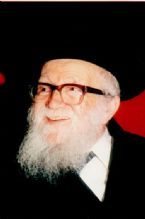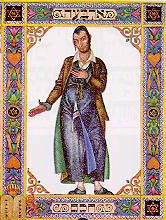Among the Four Sons listed during the Seder, we identify most with the Wise Son. We don't really accept the premise of the Wicked Son (we might criticize children today for acting badly, but we don't identify them as "bad" or wicked children), and we like to hope that our children grow out of being either Simple or that they Don't Know to Ask.
Which leaves us with the Wise Son. Who among us don't really, deep down in our heart, consider our children "Wise"? Moreover, looking at his question, we recognize that his question is excellent:
חָכָם מָה הוּא אוֹמֵר? מַה הָעֵדוֹת וְהַחֻקִּים וְהַמִשְׁפָּטִים אֲשֶׁר צִוָּה ה' אֱלֹקינוּ אֶתְכֶם?
What does the Wise Son say? "What are the testimonies, statutes and dictates that the Lord our God commanded you?"
In fact, we find this exact question in the Torah, as Moshe instructs the Jewish people,
כִּי-יִשְׁאָלְךָ בִנְךָ מָחָר, לֵאמֹר: מָה הָעֵדֹת, וְהַחֻקִּים וְהַמִּשְׁפָּטִים, אֲשֶׁר צִוָּה ה' אֱלֹקינוּ, אֶתְכֶם.
When your son asks you in time to come, saying: 'What is the meaning of the testimonies, and the statutes, and the ordinances, which the Lord our God has commanded you? (Devarim 6:20)
Ibn Ezra explains that the word מה – does not mean "what", but instead means למה – "what is the reason". In essence, the Wise Son asks, "Why do we do keep of these commandments?" It's not just an ancient question found in the Chumash. Rather, it's an eternal question, asked by children – good, wise children – throughout Jewish history.
Every Jewish parent should not only expect this question, but should hope for it. We want our children to ask. We want them to inquire about why we do what we do. But, if we want them to ask good questions, we better be ready with good answers. What indeed do we tell them when they ask us, "Why should I keep the Torah? Why do you keep the Torah?" (Because I said so only works for the first few years. After that, you'll need to provide a better answer.)
The Hagaddah provides an answer – and that's where we begin to run into problems.
וְאַף אַתָּה אֱמָר לוֹ כְּהִלְכוֹת הַפֶּסַח: אֵין מַפְטִירִין אַחַר הַפֶּסַח אֲפִיקוֹמָן.
You, in turn, shall instruct him in the laws of Passover, [up to] `one is not to eat any dessert after the Passover-lamb.
What is the relevance of the answer we give him to his question? He's asking why we keep the commandments, and we're talking about dessert and the Korban Pesach? This isn't my own question, either. Ritva, is his commentary to the Hagadah writes,
וקשה, מה ענין תשובה זו לשאלה זו?
This is difficult, as what is the relevance of the answer to the question?
Moreover, we ourselves need not search for an answer to this great question, as Moshe Rabbeinu has already provided us a wonderful, powerful answer. Right after telling us what our children will ask us in the future, Moshe teaches us how to answer them.
וְאָמַרְתָּ לְבִנְךָ, עֲבָדִים הָיִינוּ לְפַרְעֹה בְּמִצְרָיִם; וַיֹּצִיאֵנוּ ה' מִמִּצְרַיִם, בְּיָד חֲזָקָה. וַיִּתֵּן ה' אוֹתֹת וּמֹפְתִים גְּדֹלִים וְרָעִים בְּמִצְרַיִם, בְּפַרְעֹה וּבְכָל-בֵּיתוֹ--לְעֵינֵינוּ. וְאוֹתָנוּ, הוֹצִיא מִשָּׁם--לְמַעַן, הָבִיא אֹתָנוּ, לָתֶת לָנוּ אֶת-הָאָרֶץ, אֲשֶׁר נִשְׁבַּע לַאֲבֹתֵינוּ. וַיְצַוֵּנוּ ה', לַעֲשׂוֹת אֶת-כָּל-הַחֻקִּים הָאֵלֶּה, לְיִרְאָה, אֶת-ה' אֱלֹקֵינוּ--לְטוֹב לָנוּ כָּל-הַיָּמִים, לְחַיֹּתֵנוּ כְּהַיּוֹם הַזֶּה. וּצְדָקָה, תִּהְיֶה-לָּנוּ: כִּי-נִשְׁמֹר לַעֲשׂוֹת אֶת-כָּל-הַמִּצְוָה הַזֹּאת, לִפְנֵי ה' אֱלֹקֵינוּ--כַּאֲשֶׁר צִוָּנוּ. (דברים ו:כ-כה)
Then you shall say to your son: 'We were Pharaoh's slaves in Egypt; and the Lord brought us out of Egypt with a mighty hand. And the Lord showed signs and wonders, great and sore, upon Egypt, upon Pharaoh, and upon all his house, before our eyes. And He brought us out from there that He might bring us in, to give us the Land which He swore to our fathers. And the Lord commanded us to do all these statutes, to fear the Lord our God, for our good always, that He might preserve us alive, as it is at this day. And it shall be righteousness to us, if we observe to do all this commandment before the Lord our God, as He has commanded us.' (Devarim 6:20-25)
This is a wonderful answer, especially when we read the text with care. In his answer, Moshe emphasizes our collective history, and our connection to our Forefathers and the Promised Land. More importantly, he describes the Torah and a life of adherence to the Mitzvot as "good", and the giving of the Torah as an eternal act of kindness that God did for us.
That's the true answer to this all-important question. We follow the Torah because we know that God wants goodness for us, and transmitted to us the ideal way to achieve that ultimate Good. While we don't always understand every detail, and cannot always perfectly answer each question, when we do answer the Wise Son, we must convey that sense of Goodness inherent in a Torah-true life.
This only makes the answer in the Hagadah all the more perplexing. Where's the connection to our history? What about the mitzvot? There isn't any mention of God! All we hear about is the Afikomen. Is that really a good answer for the Wise Son? Couldn’t the Hagadah have given us a better answer?
Ritva explains that the key word in the answer to the Wise Son is the word אף – "even". The answer provided here isn't the whole answer. Rather, it's the very end of the answer.
Of course we must provide the complete answer. and any Seder that doesn't address these critical questions, and focuses only on the minutia of the practical aspects of the Seder (How much Matzah to eat; how quickly to eat it, etc.) misses the most important element of the Seder. The very essence of the Seder is answering the underlying question of the Wise Son: "Why are we sitting here tonight?"
Only when we have finished answering his questions – all of them! – can we then proceed to the more intricate aspects of the Seder. Only then, וְאַף אַתָּה אֱמָר לוֹ כְּהִלְכוֹת הַפֶּסַח – "even teach him about the halachot of Pesach".
As parents, we sometimes fail in this critical mission. Sadly, we're good at details and minutia and "do it because I told you to," but fail miserably to convey the sense of goodness, fulfillment and love that the Torah brings into our lives. We fail to address the deeper questions, somehow afraid that we might say something wrong, give an incorrect answer, and mislead our children away from the truth.
Yet, the opposite is true. We must simply do our best and answer these challenging questions as best we can. We can start by studying the answers that appear in the Torah. But then we can and should answer the question our children really want to know: Not "why should they be Jewish?", but "Why are we Jewish, and why do we keep the Torah?"
 Rav Yisraeli, in essay on Yom Ha'atzmaut, offers a number of suggestions why it's better for a religious Jew to live in Israel than in Passaic. But his final answer, quoting Rav Kook, sets our sights much, much higher.
Rav Yisraeli, in essay on Yom Ha'atzmaut, offers a number of suggestions why it's better for a religious Jew to live in Israel than in Passaic. But his final answer, quoting Rav Kook, sets our sights much, much higher.
















